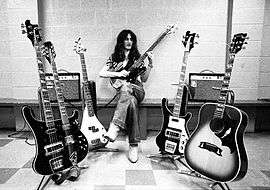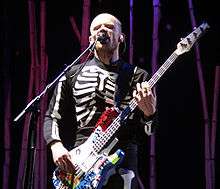Bassist
A bassist, or bass player, is a musician who plays a bass instrument such as a double bass (upright bass, contrabass, wood bass), bass guitar, synthbass, keyboard bass or a low brass instrument such as a tuba or sousaphone. Different musical genres tend to be associated with one or more of these instruments. Since the 1960s, the electric bass has been the standard bass instrument for funk,[2] R&B, soul music, rock and roll, reggae, jazz fusion, heavy metal, country and pop music. The double bass is the standard bass instrument for classical music, bluegrass, rockabilly, and most genres of jazz. Low brass instruments such as the tuba or sousaphone are the standard bass instrument in Dixieland and New Orleans-style jazz bands.
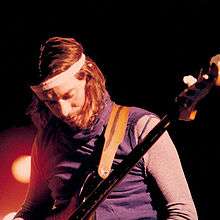
Despite the associations of different bass instruments with certain genres, there are exceptions. Some new rock bands and bassist used a double bass, such as Lee Rocker[3] of Stray Cats, Barenaked Ladies and Tiger Army. Larry Graham, Bernard Edwards, Mick Hogan, Andy Fraser, and Mel Schacher[4] used electric bass guitar. Some funk, R&B and jazz, fusion groups use synth bass or keyboard bass rather than electric bass. Bootsy Collins, Stevie Wonder, Kashif and Kevin McCord(One Way) used synth bass. Some Dixieland bands use double bass or electric bass instead of a tuba. In some jazz groups and jam bands, the basslines are played by a Hammond organ player, who uses the bass pedal keyboard or the lower manual for the low notes.
Electric bass players
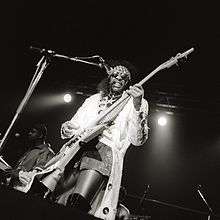
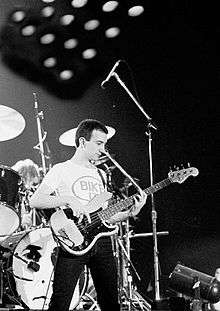
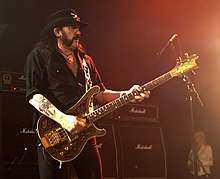
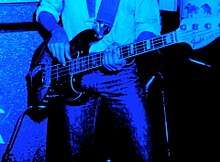
Electric bassists play the bass guitar. In most rock, pop, metal and country genres, the bass line outlines the harmony of the music being performed, while simultaneously indicating the rhythmic pulse. In addition, there are many different standard bass line types for different genres and types of song (e.g. blues ballad, fast swing, etc.). Bass lines often emphasize the root note, with a secondary role for the third, and fifth of each chord being used in a given song. In addition, pedal tones (repeated or sustained single notes), ostinatos, and bass riffs are also used as bass lines. While most electric bass players rarely play chords (three or more notes all sounded at the same time), chords are used in some styles, especially funk, R&B, soul music, jazz, Latin and heavy metal music.
A short list of notable bassists includes:
- Mark Adams (Funk band:Slave)
- Jeff Ament (Pearl Jam)
- Victor Bailey (Weather Report)
- Steve Bailey (Victor Wooten, Dizzy Gillespie, Michel Camilo, Jethro Tull)
- Ronnie Baker (MFSB, Philly soul)
- Michael "Flea" Balzary (Red Hot Chili Peppers)
- Robert "Kool" Bell (Kool & the Gang)
- Rex Brown (Pantera, Down)
- Jack Bruce (Cream)
- Jean-Jacques Burnel (The Stranglers)
- Cliff Burton (Trauma, Metallica)
- Geezer Butler (Black Sabbath, GZR, Ozzy Osbourne)
- Tony Campos (Fear Factory, Soulfly, Static-X)
- Alain Caron (Soloist, UZEB)
- Liam Carey (The Bucket Boys)
- Justin Chancellor (Tool)
- Stanley Clarke (Jazz, crossover, fusion)
- Adam Clayton (U2)
- Les Claypool (Primus)[5]
- Nick O'Malley (Arctic Monkeys)
- Tommy Cogbill (Aretha Franklin)
- Bootsy Collins (P Funk)
- Melvin Lee Davis (Chaka Khan, The Pointer Sisters, Gladys Knight & The Pips)
- John Deacon (Queen)
- Tim Commerford (Rage Against the Machine, Audioslave)
- Steve Di Giorgio (Death, Testament)
- Mike Dirnt (Green Day)
- Donald 'Duck' Dunn (Booker T & MGs, Stax Records)
- Jimmy Earl (Stanley Clarke, Chick Corea)
- Nathan East (Eric Clapton, Fourplay, Phil Collins, Philip Bailey)
- Paul McGuigan (Oasis)
- Mani (The Stone Roses, Primal Scream)
- Tommy Caldwell (The Marshall Tucker Band)
- Chuck Dukowski (Black Flag)[6]
- Bernard Edwards (Chic)
- David Ellefson (Megadeth)
- John Entwistle (The Who)
- Dave Farrell (Linkin Park)
- Nikolai Fraiture (The Strokes)
- Andy Fraser (Free)
- Billy Gould (Faith No More)
- Roger Glover (Deep Purple)
- Simon Gallup (the Cure)
- Colin Greenwood (Radiohead)
- Kim Gordon (Sonic Youth)
- Nate Dominy (Gifts From Enola)
- Larry Graham (Sly and the Family Stone, Graham Central Station)
- Stuart Hamm (Joe Satriani, Steve Vai, Frank Gambale)
- Jimmy Haslip
- Steve Harris (Iron Maiden)
- Marco Hietala (Nightwish, Tarot)
- Peter Hook (Joy Division) (New Order)[7]
- David Hood (Muscle Shoals sound)
- Anthony Jackson
- James Jamerson (The Funk Brothers of Motown)
- Neil Jason (Cyndi Lauper, Dire Straits, Brecker Brothers, Roxy Music, Paul Simon, John Lennon, David Sanborn, Saturday Night Live Band, CBS Orchestra)
- Jerry Jemmott (King Curtis)
- Darryl Jones (Miles Davis, Peter Gabriel, The Rolling Stones, Eric Clapton)
- John Paul Jones (Led Zeppelin)
- Mick Karn (Japan)
- Joseph Karnes (Fitz and The Tantrums)
- Carol Kaye (studio musician on many recordings)
- Ian "Lemmy" Kilmister (Motörhead)
- Mark King (Level 42)
- Abraham Laboriel (Koinonia)
- Geddy Lee (Rush)
- Ryan Martinie (Mudvayne)
- Paul McCartney (The Beatles, Wings)
- Marcus Miller (Jazz, crossover, fusion)
- Monk Montgomery (Wes Montgomery, Lionel Hampton, The Crusaders, Art Farmer)
- John Myung (Dream Theater)
- Jason Newsted (Voivod, Metallica, Ozzy Osbourne)
- Pino Palladino (The Who, Roy Hargrove, Steve Gadd)
- Jaco Pastorius (Pat Metheny, Weather Report, Joni Mitchell)
- John Patitucci (Chick Corea)
- Wayne Pedzwater (Buddy Rich, Michael Jackson, Blood, Sweat & Tears)
- Guy Pratt (Pink Floyd, David Gilmour, Roxy Music)
- Pino Presti (Gerry Mulligan, Astor Piazzolla, Quincy Jones, Wilson Pickett, Shirley Bassey, Mina)
- Chuck Rainey(Crossover, R&B)
- Kira Roessler (Black Flag)[8]
- Mel Schacher (Grand Funk Railroad)
- Steven Severin (Siouxsie and the Banshees)
- Billy Sheehan (Niacin, Mr. Big, Steve Vai, David Lee Roth)
- Ben Shepherd (Soundgarden)
- Paul Simonon (The Clash)
- Chris Squire (Yes)
- Sting (The Police)
- Jeroen Paul Thesseling (Obscura, Pestilence)
- Fred Thomas (James Brown)
- Robert Trujillo (Suicidal Tendencies, Metallica)
- Sid Vicious (Sex Pistols)
- Mikey Way (My Chemical Romance)
- Roger Waters (Pink Floyd)
- Mike Watt (Minutemen, fIREHOSE)[9][10]
- Tina Weymouth (Talking Heads)
- Doug Wimbish (Sugarhill Gang)
- Nicky Wire (Manic Street Preachers)
- Victor Wooten
- Bill Wyman (The Rolling Stones)
Double bass players
Classical double bass players
For a long list, see the List of contemporary classical double bass players.
A shortlist of notable double bass players includes:
- Giovanni Bottesini (1821–1889) bassist, composer, conductor
- Domenico Dragonetti (1763–1845) bassist, composer, conductor
- Gary Karr (1941–present)
- Serge Koussevitzky (1874–1951) bassist, conductor, composer
- Edgar Meyer (1960–present)
- Edouard Nanny (1872–1943) bassist, composer, pedagogue
- Franz Simandl (1840–1912) bassist, composer, pedagogue
- Johannes Matthias Sperger (1750–1812) bassist, composer
Jazz double-bass players

For a long list, see the List of jazz bassists, which includes both double bass and electric bass players.
A shortlist of notable jazz bassists includes:
- Arild Andersen
- Jimmy Blanton
- Ray Brown
- Ron Carter
- Paul Chambers
- Palle Danielsson
- Richard Davis
- Scott La Faro
- Renaud Garcia-Fons
- Jimmy Garrison
- Terje Gewelt
- Eddie Gómez
- Charlie Haden
- Milt Hinton
- Dave Holland
- Marc Johnson
- Sam Jones
- Per Mathisen
- Charles Mingus
- Red Mitchell
- George Mraz
- Niels-Henning Ørsted Pedersen
- Billy Peterson
- Terry Plumeri
- Esperanza Spalding
- Ole Morten Vågan
- Ellen Andrea Wang
Popular music double bass players
For a longer list, see the List of double bassists in popular music, which includes blues, folk, country, etc.
A shortlist of the notable bassists in these genres includes:
References
- "Jaco Pastorius Is the Most Important Musician You Might Have Never Heard Of". vice.com. 6 March 2015.
- "On Bass: What the Funk?". premierguitar.com.
- https://www.axs.com/double-bassist-lee-rocker-is-still-jamming-and-touring-46181
- http://www.grandfunkrailroad.com/bios/Mel_bio.html
- Newcomb, Ming Lee (19 February 2019). "10 Years with Les Claypool: On Sailing the Seas of Cheese and Avoiding Dead Sharks". Consequence of Sound. Retrieved 10 April 2020.
- Cohan, Brad (18 September 2013). "FLAG'S Chuck Dukowski Pretty Much Confirms Greg Ginn Is a Total Douchebag". Village Voice. Retrieved 10 April 2020.
- Edwards, Briony (21 March 2017). "The 10 best Joy Division/New Order basslines, according to Peter Hook". Louder Sound. Retrieved 10 April 2020.
- Meltzer, Marisa (2010). Girl Power: The Nineties Revolution in Music. Farrar, Straus and Giroux. p. 130. ISBN 9781429933285.
- Suarez, Gary (14 November 2016). "1995: The Year Mike Watt Broke Grunge". Vice. Retrieved 10 April 2020.
- Sheppard, Amanda (29 October 2019). "FROM MINUTEMEN TO MISSINGMEN: MIKE WATT AND FRIENDS CARRY ON". Please Kill Me. Retrieved 10 April 2020.
